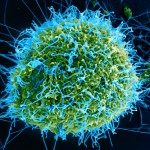Link to Pubmed [PMID] – 18703703
Blood 2008 Nov;112(9):3772-6
Rhesus macaques are resistant to infection by HIV-1 as a result of an innate cellular restriction mechanism attributable to the expression of rhTRIM5alpha, a member of the large tripartite motif (TRIM) protein family. TRIM5alpha-mediated restriction, which occurs before reverse transcription through targeting of the HIV-1 capsid, has been identified in a number of macaque primary cells and cell lines and is thought to occur in all macaque cell types. We report, however, that rhesus macaque dendritic cells (DCs) lack TRIM5alpha-mediated restriction and are equally permissive to HIV-1 infection as human DCs. Evidence suggests that, although TRIM5alpha RNA levels are normal in these cells, the protein may be dysfunctional. We propose that abrogation of TRIM5alpha-mediated restriction in DCs, although still operative in cells that replicate HIV-1 (macrophages, T lymphocytes), illustrates the need for innate mechanisms to not inhibit adaptive immune responses to ensure an optimal fight against pathogens.

